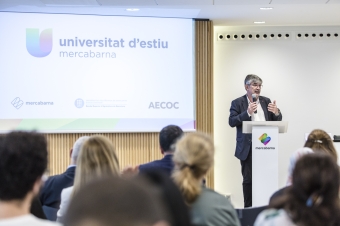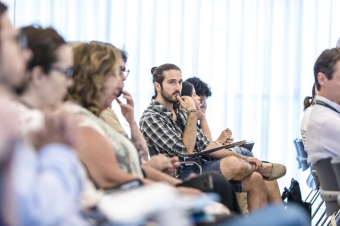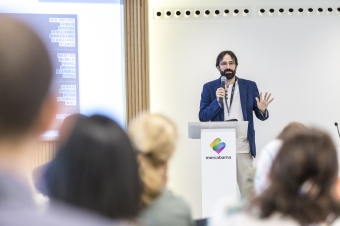Mercabarna becomes a forum for debate on agri-food sustainability
July 2018
Around a hundred people, including professionals and university students, took part in the first Mercabarna Summer University.
The Mercabarna Summer University, an initiative designed to be the leading annual gathering in the sector, took place from 2 to 6 July. Those attending, mainly professionals from the agri-food sector and students from various engineering fields (food, agriculture and biosystems), had the opportunity to discover the latest trends in sustainability, thanks to lecturers representing every stage of the food chain, from the primary sector to wholesale, as well as the world of research.
In the opinion of Agustí Colom, Councillor for Tourism, Commerce and Markets and President of Mercabarna, the Summer University is founded on the desire to move the sector towards practices based on environment-focused responsibility and awareness. "We want a more sustainable, environmentally-friendly agri-food chain because there is already a great social demand for this, and because adapting to this growing need of our citizens presents a great opportunity for agri-food companies," said Colom during the inaugural speech. This first edition was organised in partnership with the School of Agriculture of Barcelona (ESAB-UPC) and the AECOC (Association of Mass Consumer Goods Companies).
360º Sustainability
The conferences, headed up by experts, researchers and managers of companies and organisations, focused on four themes, which provided a comprehensive overview of sustainability in the agri-food sector. Sustainable development in Europe was the theme of the University's first day's conference, analysing how company projects can be brought into line in order to achieve the United Nations (UN) Sustainable Development Goals, and which business strategies enable the current challenges to be met.
The second day was dedicated to technological innovation and the digitalisation of the food chain. On the third day, good practices for sustainable resource and supply chain management were presented, with particular emphasis on initiatives to combat food waste. In this context, the future Mercabarna Food Management Centre was introduced. This will focus on optimising the process of food selection and will mean an increase of the amount of products donated to charitable organisations. This presentation by Pablo Vilanova, Mercabarna's Director of Strategy, was followed by a lunch prepared using products recovered by the Espigoladors group. Last, but not least, on the final day, the themes of food quality and safety and online reputation management were presented by experts in crisis communication and social media.
The Summer University took place in an atmosphere characterised by cooperation, transfer of knowledge and networking. In this regard, the fifth day was set aside for a workshop, at which students and graduates of the university worked on the challenges posed by the Food Unit companies. The results were presented to those responsible for human resources and managers from the participating companies. One of the strengths of the Summer University was the fact that it took place at in Mercabarna, the central hub of the Catalan food chain. The delegates visited the wholesale food market to gain first-hand knowledge of the activities of some of the companies based there, including the fruit and vegetable, fish and seafood and services sectors. Moreover, two examples of eco-innovation were presented.















